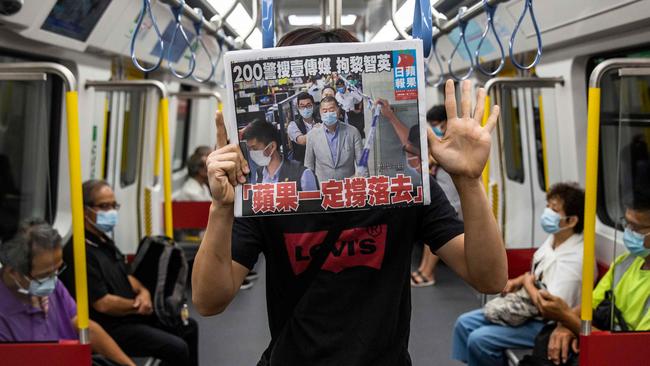Hong Kong mogul Jimmy Lai as guilty as sin – he spoke truth to power


After his return, a vast catch-all law is passed to criminalise thought, speech or behaviour deemed contrary to national security. A few weeks later he is seized at home under this law, apparently for colluding with a foreign power, and 200 police officers make further arrests in The Australian’s newsroom for similar thought and speech crimes. The potential penalty: life imprisonment.
This may help give a flavour of the latest travails in Hong Kong, with the arrest of Jimmy Lai, the owner of the city’s biggest listed media company, including the most-read paid newspaper Apple Daily, which is also the most critical of the unelected governments there and in Beijing.
Lai, whose crimes appear to include meeting US Vice-President Mike Pence and Secretary of State Mike Pompeo in Washington a year ago, joins the growing ranks of prominent democrats rapidly being arrested under the draconian new national security law imposed on the city by the People’s Republic of China.
David Leung has quit as Hong Kong’s director of public prosecutions because his office is not involved in NSL arrests, conducted by a special new security police force, with some trials to be held in secret, others consigned to courts in mainland China — conviction rate nearly 100 per cent — where resulting sentences will be served.
The crushing of Hong Kong through the imposition of this new legislation and the accompanying deployments of security agents, is widely perceived in Beijing as “People’s Leader” Xi Jinping’s second great accomplishment of the year, after his winning the war against COVID-19 — unlike the weak Western states.
But the Legislative Council election due next month loomed as a concern for the government, following the landslide victory of pro-democrat parties in local council elections last November. So the poll has been postponed for a year due to alleged COVID-19 concerns, even though other Asian countries have recently conducted elections successfully, including Malaysia, Mongolia, Japan, Singapore, South Korea and Sri Lanka.
The mainland China media coverage of the protest movement in Hong Kong has focused on it being foreign-instigated. This reflects the Chinese Communist Party nostrum that “the masses” can feel — as in, “you have hurt the feelings of the Chinese people” — but not think for themselves. Under this construct, Hong Kongers should thus be happy merely to keep making money — if it were not for nefarious outsiders seducing them to demonstrate for freedom and the rule of law. Within the mainland, criticism of the party and government is illegal, and when foreign instigators are involved that becomes treasonous. Such concepts are now extended to Hong Kong, for the sake of “national security”.
The city is losing as a result its former role as safe ground to discuss what’s happening on the mainland, or to write contracts assured of transparency, and of independent courts. Chris Buckley, the doyen of Australian reporters covering China, the New York Times’ leading correspondent, has thus been denied a journalist’s visa in Hong Kong.
Lai is twice guilty — of speaking truth to power, and of being the most effective voice of Hong Kong to the world. When I interviewed him for this newspaper a few years ago I encountered a classic individualist, 21st-century, Chinese-world success story, smuggled 59 years ago, aged 12, from struggle street in neighbouring Guangdong, today restlessly fit mentally and physically, an entrepreneur who jumps industries with ease, a student of philosophy, a Catholic-convert father of six, outstandingly well-read and fluent in English.
He started as a child-worker in a factory, and soon enough founded Asia’s first clothing chain, naming it Giordano, then jumped to media. His ultimate goal is to help open up China. But he’s no idealist, he told me: “Nothing is ideal. The world is destroyed by people who have ideals more than by pragmatists. The dreamers are mostly devils in disguise. People who want to be saviours want to play God.” When change comes to China, he believes, “it will be very quick, and I hope through evolution not revolution. I hope the communists can change.”
Right now, Lai is living on that hope as never before.
Rowan Callick, twice a China correspondent for The Australian and the author of a book on post-British Hong Kong, is an industry fellow with Griffith University’s Asia Institute



Imagine if this newspaper’s illustrious editor-at-large Paul Kelly were to travel, as he has done often, to the US to participate in an Australian American Leadership Dialogue, and were to voice there some criticisms of aspects of Australia’s governance.